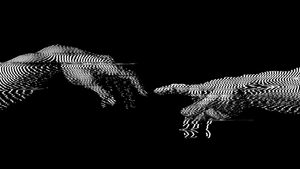Universal Music has announced a partnership with technology company SoundLabs that will give artists signed to the major access to a new AI vocals tool. Among other things, it will allow them to “sing in languages they don’t speak”. Meanwhile, TikTok has unveiled its own new AI tools that brands and creators can use to create multilingual avatars, helping to expand global reach and localise content and campaigns.
These technologies create an interesting dilemma for artists and other creators. There are concerns that generative AI models that replicate a person’s voice and likeness are a threat to human creativity. But, at the same time, those models can be useful for artists and creators looking to expand their output and reach new audiences.
Is this what AI translations could sound like?
SoundLabs was founded by producer and songwriter BT. The deal with Universal relates to a tool called MicDrop, via which participating artists can “create custom vocal models”. That, says the music company’s SVP Strategic Technology Chris Horton, will then allow those artists to “push creative boundaries using voice-to-voice AI to sing in languages they don’t speak, perform duets with their younger selves, restore imperfect vocal recordings, and more”.
TikTok’s new tools can be used by creators to “leverage their own likeness and construct multi-lingual avatars” which can then feature in their videos. Brands can also create avatars for their spokespeople, or they can partner with a TikTok creator and utilise the avatar they have developed. Or, alternatively, they can utilise various pre-built avatars that TikTok has generated in partnership with a group of actors.
With all the concerns around generative AI models being trained with unlicensed third-party content - and being used to infringe the personality rights of artists and creators - both SoundLabs and TikTok are keen to stress that these tools are designed to empower the creators whose voice and likeness will be imitated.
TikTok stresses that the actors involved in creating its pre-built avatars were paid for their involvement. And the creators who now interact with the new tools will have control over their avatars, and be able to “propel their creativity to a global audience with the power of generative AI”, while “scaling their opportunities with brands”.
With SoundLabs, the custom vocal models generated with participating artists will be “available for their exclusive creative use cases and not available to the general public”, we are told.
Founder BT adds, “We believe the future of music creation is decidedly human. Artificial intelligence, when used ethically and trained consensually, has the promethean ability to unlock unimaginable new creative insights, diminish friction in the creative process and democratise creativity for artists, fans and creators of all stripes. We are designing tools not to replace human artists, but to amplify human creativity”.
Of course, even legitimate and licensed generative AI models will create new competition in the creative marketplace. However, many artists and creators will likely accept there isn't much that can be done about that and, in the meantime, embracing these tools can enhance creativity and productivity. And, if nothing else, allow you to sing or chat in a lot more languages.

